|
Books Should Be Free Loyal Books Free Public Domain Audiobooks & eBook Downloads |
|
|
Books Should Be Free Loyal Books Free Public Domain Audiobooks & eBook Downloads |
|
Humorous Books |
|---|
|
Book type:
Sort by:
View by:
|
By: Henry Wallace Phillips (1869-1930) | |
|---|---|
 Mr. Scraggs
Mr. Scraggs
| |
 Trolley Folly
Trolley Folly
This collection of eleven short stories is packed with Henry Wallace Phillips' offbeat humor. You will find a trolley car driver, bored with his route, who decides to drive around town instead. There are a couple of men unfamiliar with the basic properties of a canoe. And watch out for the curse of the chewing gum. Fun to read. Fun to record | |
By: Herbert George Jenkins (1876-1923) | |
|---|---|
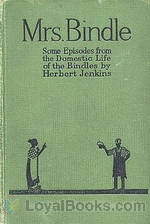 Mrs. Bindle
Mrs. Bindle
Herbert Jenkins' most popular fictional creation was Mr. Joseph Bindle, who first appeared in a humorous novel in 1916 and in a number of sequels. In the preface to the books, T. P. O'Connor said that "Bindle is the greatest Cockney that has come into being through the medium of literature since Dickens wrote Pickwick Papers". The stories are based on the comedic drama of life at work, at home and all the adventures that take place along the way. It becomes clear as the stories progress that Bindle would not be who he is without Mrs. Bindle, and this book seeks to tell the stories of the Bindles from the distaff point of view. | |
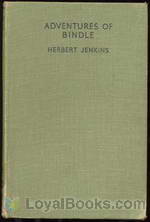 Adventures of Bindle
Adventures of Bindle
Jenkins' most popular fictional creation was Mr. Joseph Bindle, who first appeared in a humorous novel in 1916 and in a number of sequels. In the preface to the books, T. P. O'Connor said that "Bindle is the greatest Cockney that has come into being through the medium of literature since Dickens wrote Pickwick Papers". The stories are based on the comedic drama of life at work, at home and all the adventures that take place along the way. | |
By: Herman Melville (1819-1891) | |
|---|---|
 The Encantadas, Or Enchanted Isles
The Encantadas, Or Enchanted Isles
The Encantadas or Enchanted Isles is a novella by American author Herman Melville. First published in Putnam's Magazine in 1854, it consists of ten philosophical "Sketches" on the Encantadas, or Galápagos Islands. It was collected in The Piazza Tales in 1856. The Encantadas was to become the most critically successful of that collection. All of the stories are replete with symbolism reinforcing the cruelty of life on the Encantadas. (Introduction excerpted from Wikipedia) | |
By: Heywood Broun (1888-1939) | |
|---|---|
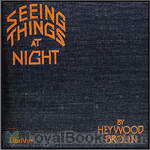 Seeing Things at Night
Seeing Things at Night
This Book is a collection of humorous short stories which describe the comedy in everyday things and situations. | |
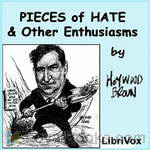 Pieces of Hate and other Enthusiasms
Pieces of Hate and other Enthusiasms
This book is a collection of humorous short stories about ordinary instances in daily life. We learn many interesting things about life, such as how to court women successfully, what it feels like to be a god, and why sometimes it would be a good idea to exchange one's own newborn baby for a better one at the hospital. | |
By: Hilaire Belloc (1870-1953) | |
|---|---|
 More Peers : Verses
More Peers : Verses
| |
By: Honoré de Balzac (1799-1850) | |
|---|---|
 Droll Stories
Droll Stories
| |
By: Hugh McHugh (1867-1926) | |
|---|---|
 Down The Line with John Henry
Down The Line with John Henry
A humorous comedy of errors and light-hearted wit in the life of the likeable John Henry. When it comes to betting at the races, booze, his friends, and his woman Clara Jane, it's never a dull moment. The Hot-Air Association is in full session! Will Clara continue to go "down the line" with John Henry? | |
By: Hugh Walpole (1884-1941) | |
|---|---|
 Jeremy And Hamlet: A Chronicle Of Certain Incidents In The Lives Of A Boy, A Dog, And A Country Town
Jeremy And Hamlet: A Chronicle Of Certain Incidents In The Lives Of A Boy, A Dog, And A Country Town
Hamlet is Jeremy’s dog. This 1923 book is Hugh Walpole’s second volume in his Jeremy semi-autobiographical trilogy , Jeremy at Crale ), about a ten-year-old English boy. One commentator wrote this of the first book: “With affectionate humor, Mr. Walpole tells the story of Jeremy and his two sisters, Helen and Mary Cole, who grow up in Polchester, a quiet English Cathedral town…. Mr. Walpole has given his narrative a rare double appeal, for it not only recreates for the adult the illusion of his own happiest youth, but it unfolds for the child-reader a genuine and moving experience with real people and pleasant things... | |
By: Imogen Clark | |
|---|---|
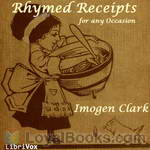 Rhymed Receipts for Any Occasion
Rhymed Receipts for Any Occasion
In addition to being amusing, recipes written in a poetic form were easy to remember and used as learning tools for the young housekeeper. Many of the poems in this 1912 publication were originally published in Woman's Home Companion, Good Housekeeping Magazine, the Housewife, Table Talk, and the Boston Cooking School Magazine. | |
By: Ingersoll Lockwood (1841-1918) | |
|---|---|
 Baron Trump's Marvellous Underground Journey
Baron Trump's Marvellous Underground Journey
The Little Baron Trump is a man of adventure. He and his dog Bulger have already braved many adventures together, but at the time our story opens, they are kind of dull at home, upset with the increasing familiarity of both two- and four legged neighbours. What to do? Luckily, an old manuscript of the learned Spaniard, Don Constantino Bartolomeo Strepholofidgeguaneriusfum, falls into his hands, and off he goes to a journey to the centre of the earth. This is a remarkable book from 1893, blending the tradition of the Münchhausen stories with more modern fantasy and science fiction. - Summary by Carolin | |
By: Irvin S. Cobb (1876-1944) | |
|---|---|
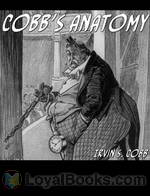 Cobb's Anatomy
Cobb's Anatomy
Irvin Shrewsbury Cobb was born on June 23, 1876. At seventeen years of age, he began writing for the Paducah Daily News, his hometown paper. At nineteen he became the managing editor; up to that point, our nation’s youngest. He worked as a columnist, a humorist and an author. But ‘horror,’ and ’short stories,’ are not why he is remembered. He is remembered because he was, and still is, funny. And although he is now dead–he died March 11, 1944–this work “Cobb’s Anatomy,” among others, has left an indelible mark upon mankind: a smile. | |
 One Third Off
One Third Off
Irvin Shrewsbury Cobb (June 23, 1876–March 11, 1944) was an American author, humorist, and columnist who lived in New York and wrote over 60 books and 300 short stories. Cobb has been described as “having a round shape, bushy eyebrows, full lips, and a triple chin. He always had a cigar in his mouth.” This book is a hilarious account of Cobb’s attempts at weight-loss. | |
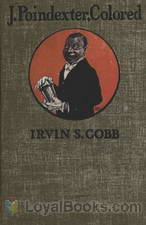 J. Poindexter, Colored
J. Poindexter, Colored
This comic novel relates the first-person adventures in New York City of Jefferson Poindexter, personal assistant to Cobb's famous Judge Priest, while the judge is vacationing abroad. (Introduction by Grant Hurlock) | |
 Roughing it De Luxe
Roughing it De Luxe
| |
 Fibble, D.D.
Fibble, D.D.
| |
 Cobb's Bill-of-Fare
Cobb's Bill-of-Fare
| |
 Eating in Two or Three Languages
Eating in Two or Three Languages
| |
By: Irving Bacheller (1859-1950) | |
|---|---|
 'Charge It' Keeping Up With Harry
'Charge It' Keeping Up With Harry
| |
 Prodigal Village; A Christmas Tale
Prodigal Village; A Christmas Tale
Small town life in early twentieth century New York state. This is a piquant parable of human nature. Bacheller's lightly humorous voice is evident throughout. Not all listeners will agree with the author's view of labor and management. - Summary by david wales | |
By: Irwin Leslie Gordon (1888-1954) | |
|---|---|
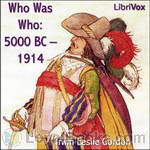 Who Was Who: 5000 BC – 1914
Who Was Who: 5000 BC – 1914
A short, humorous biography of famous people from 5000 BC to 1914. — S. McGaughey From the Introduction, “The editor begs leave to inform the public that only persons who can produce proper evidence of their demise will be admitted to Who Was Who. Press Agent notices or complimentary comments are absolutely excluded, and those offering to pay for the insertion of names will be prosecuted. As persons become eligible they will be included without solicitation, while the pages will be expurgated of others should good luck warrant.” | |
By: Irwin S. Cobb (1876-1944) | |
|---|---|
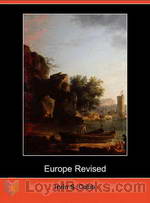 Europe Revised
Europe Revised
Irwin Cobb’s humorous Europe Revised is a travelogue and comedy almost in the style of Mark Twain. The dedication says it best, “To My Small DaughterWho bade me shed a tear at the tomb of Napoleon, which I was very glad to do, because when I got there my feet certainly were hurting me.” | |
By: Israel Zangwill (1864-1926) | |
|---|---|
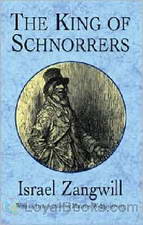 The King of Schnorrers
The King of Schnorrers
Manasseh da Costa is a schnorrer (beggar) who lives on the charitable contributions of the Jews of late 18th-century London. But Manasseh is far from being a humble panhandler for, as every schnorrer knows, supporting the poor is a commandment from God (a mitzvah) not just a favour. And as the descendant of Portuguese Jews who had lived in England for many generations, Manasseh is the social superior of those newly arrived from Eastern Europe (called ‘Tedesco’), even his wealthy patron Joseph Grobstock... | |
 Bachelors' Club
Bachelors' Club
The Bachelors' Club is a sanctuary for an elite group of London's unmarried men to gather. To qualify as a Bachelor, each had to undergo a strict background check to ensure that they were not only unmarried, but a zealot in the movement that held marriage to be an undue punishment...upon women. As our story goes, we learn many revealing things about these men's convictions and pasts, as well as insightful commentaries on life and society in 1890 that is markedly similar to today. Summary by Keith Salis | |
 Grotesques and Fantasies
Grotesques and Fantasies
A set of often funny, sometimes tragic stories by Israel Zangwill. Most famous for his scathingly accurate portrayals of the Jewish ghetto, these stories have a wider stage, poking fun at social conventions and society itself, both high and low. The real and the fantastic collide to produce a world uniquely Zangwill's.These are the tales of figures as diverse as a pantomime dragon, an excellent butler, a man living his life in the wrong order and a Jewish maiden who knows exactly what she is worth... | |
By: J. Jefferson Farjeon (1883-1955) | |
|---|---|
 No. 17 (Number 17)
No. 17 (Number 17)
A thriller about a down-and-out sailor finding his way in London. The book followed a successful play that was filmed by Alfred Hitchcock, and even made into a silent film. Its humour is irresistible. - Summary by Czandra | |
By: J. L. Duff | |
|---|---|
 The Rubaiyat of Ohow Dryyam With Apologies to Omar
The Rubaiyat of Ohow Dryyam With Apologies to Omar
| |
By: J. M. Barrie (1860-1937) | |
|---|---|
 My Lady Nicotine A Study in Smoke
My Lady Nicotine A Study in Smoke
| |